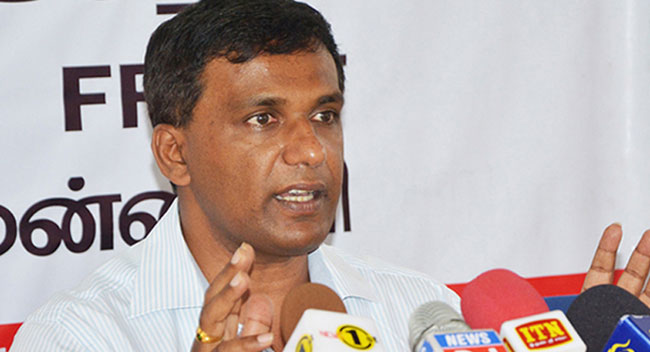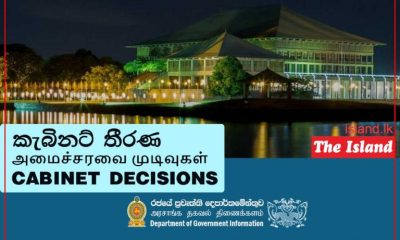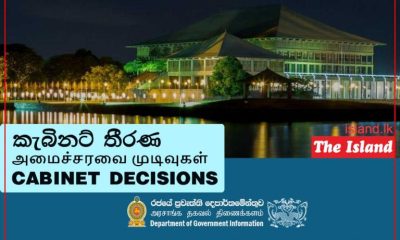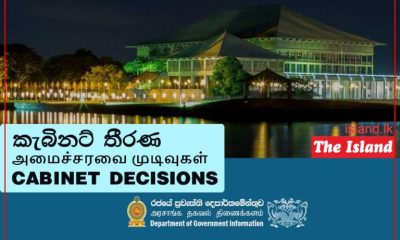News
‘Abolition of range of taxes in Nov 2019 triggered crisis’

‘Welcome fuel price hike, stresses need to increase gas price’
By Shamindra Ferdinando
Former Governor of Uva, Southern and Central Province Rajith Keerthi Tennakoon says the government is paying a huge price for the continuing failure to streamline the tax collection process, corrupt practices and the utterly unwise decision to change the tax policy immediately after the change of government in Nov 2019.
Civil society activist Tennakoon alleged that the Treasury lost well over Rs. 500 bn due to a controversial decision to do away with a range of taxes, including PAYE (Pay As You Earn), NBT (Nation Building Tax), Withholding tax, Capital Gain tax imposed on the Colombo Stock Exchange, Bank Debit tax and unprecedented reduction of VAT (Value Added Tax).
Tennakoon said that the 15% VAT and the 2% NBT which amounted to 17% imposed on all goods and services were unified and reduced to 8%, effective from the first of December 2019.
Tennakoon said that the decision was taken at the first cabinet meeting of the incumbent government held on Nov 27, 2019.
The civil society activist turned political henchman under President Sirisena, asked whether ordinary people benefited from those tax cuts though the government spokespersons repeatedly said so.
Referring to the Central Bank Report 2020, Tennakoon said that the total revenue for 2018 and 2019 had been Rs 1,950 bn and Rs 1,900 bn, respectively, whereas it dropped to Rs 1,373 in 2020. Tennakoon asked whether the government carried out a proper study before such a drastic revision of tax policy was implemented or simply went ahead with it in view of the parliamentary election scheduled for April of the following year. The election had to be put off for August 2020 due to the first Covid-19 eruption, Tennakoon pointed out, urging the government to undertake a tax review immediately or face the consequences.
The total government revenue as a percentage of the GDP (Gross Domestic Product) dropped to 9.05% in 2020 from 12.6% in the previous year whereas tax revenue dropped to 8.5% from 11.6%, Tennakoon said.
He however welcomed the government decision to increase fuel prices. Declaring the upward price revision announced by Energy Minister Udaya Gammanpila on June 11 was timely, the former Governor said that the country would have been in a far worse situation if the unrealistic old pricing structure was retained.
Tennakoon said that the Opposition hadn’t really understood the crisis the country was in. If they actually examined the situation, it wouldn’t have moved a No Confidence Motion (NCM) against Energy Minister Gammanpila over the increase in fuel prices, Tennakoon said.
Instead, he argued that the NCM should have been moved against the government for jeopardizing the national economy by foolish political decision to abolish a sound tax structure in place, the former Executive Director of polls monitoring body CAFFE (Campaign for Free and Fair Elections) said.
Tennakoon questioned the rationale in demanding that the fuel prices be brought down at a time all political parties represented in parliament should address the overhanging foreign and local debt as a menacing national challenge. Pointing out that the country’s growing oil bill could overwhelm the national economy unless remedial measures were taken, Tennakoon emphasized that there should be a national consensus on the fuel pricing formula regardless of the government in power.
Those who demanded Minister Gammanpila’s resignation over the fuel price increase were conveniently silent now because they were aware of the actual situation, Tennakoon said.
Responding to another query, Tennakoon urged the government to revise the prices of domestic and industrial gas without further delay.
Tennakoon said that the government should take the public into confidence. It shouldn’t hesitate to explain the difficulties experienced due to choking of major revenue sources- remittances from Sri Lankans working abroad, tourism, garments and other exports, he said.
The civil society activist applauded the stand taken by the Energy Minister amidst attacks on him. Nothing that Presidential Secretariat, too, acknowledged the threat faced by the banking system due to CPC and CEB debt to Bank of Ceylon and People’s Bank to the tune of Rs 737 bn and President Gotabaya Rajapaksa acknowledging the daunting challenge in annual debt payment amounting to USD 4 bn, Tennakoon said that the country was experiencing worst post-independence crisis.
Whatever various government spokespersons uttered, the country was in such economic turmoil, the situation couldn’t be reversed only by restructuring the country’s debt with the IMF’s intervention, Tennakoon said.
Referring to the recent report of COPA (Committee on Public Accounts) report handed over to the Parliament on July 20, Tennakoon pointed out the failure on the part of the Inland Revenue, Sri Lanka Customs and Excise Department was quite shocking. The Finance Ministry couldn’t absolve itself of the responsibility for proper overseeing of the tax collection structure, Tennakoon said.
Commenting on shocking revelations made by a 22-member parliamentary watchdog in its latest report, Tennakoon emphasized corruption paved the way for irregularities. Such practices caused automatic losses to the Treasury, he said. Alleging that successive governments turned a Nelsonian eye to such brazen corrupt practices, Tennakoon said that the national economy was now in such a precarious situation, immediate remedial measures were required to thwart a calamity.
Quoting from CBSL reports, Tennakoon said that the country’s overall debt now stood at over 16.2 trillion. The government should realize that the issue at hand couldn’t be addressed by printing money and propaganda, Tennakoon said. The SLPP should never have abolished the entire range of taxes at the onset of the new administration, Tennakoon said, urging the government to examine the need to change the overall tax structure. How could they justify overly indirect taxes whereas the direct tax regime remains absurdly low?
Tennakoon insisted that the national economy couldn’t be saved by giving tax amnesty to defaulters. Such tax amnesties announced by successive governments since the 1960s didn’t produce the desired results, he said.
News
Cabinet nod to accept Japanese government grant of 08 used low floorboard buses

The Cabinet of Ministers approved the resolution furnished by the Minister of Transport, Highways and Urban Development to accept 08 used low floorboard buses offered as a grant by the Government of Japan.
News
Payment of the financial subsidy for fertilizer to farmers cultivating paddy lands for the Yala season 2026.

While approval has been granted at the Cabinet meeting held on 18.08.2025 to pay the financial subsidy for fertilizer to farmers cultivating paddy lands for the Maha season 2025/26, the programme is planned to be continued for the Yala season 2026 as well.
Accordingly, the Cabinet of Ministers approved the resolution furnished by the Minister of Agriculture, Livestock, Lands and Irrigation to pay a financial subsidy of Rupees 25,000/- per hectare and for a maximum of 02 hectares per farmer for paddy cultivation and to pay Rupees 15,000/- per hectare for field crops cultivated in paddy lands[maximum of 02 hectares per farmer]
News
Ministerial Committee appointed to submit recommendations on proposed program to mitigate loss of crops to wild animals

The rural agricultural livelihood and food security have been severely impacted due to the damage caused by wild animals such as elephants, wild boars, monkeys, toque macaque, squirrels, and peacocks roaming around human habitats and cultivated lands.
Animal-human conflicts and property destruction have mostly been reported around these areas, and serious social and economic issues have also arisen.
Therefore, the Ministry of Agriculture, Livestock, Land, and Irrigation has prepared a comprehensive program based on the opinions of all stakeholders, including the public, university community, farmers’ organizations, environmentalists, non-governmental organizations which work for environmental issues, the Department of Agriculture, the Department of Agrarian Development, and other relevant organizations.
Taking into consideration the report submitted by the Minister of Agriculture, Livestock, Land, and Irrigation, the Cabinet of Ministers has decided to appoint a ministerial committee with the participation of other relevant ministers, chaired by the Minister of Agriculture, Livestock, Land, and Irrigation, to submit appropriate recommendations on how the aforementioned program should be implemented by further reviewing the proposals included in the said program and incorporating new proposals.
-

 Features3 days ago
Features3 days agoBrilliant Navy officer no more
-

 Opinion6 days ago
Opinion6 days agoJamming and re-setting the world: What is the role of Donald Trump?
-

 Features6 days ago
Features6 days agoAn innocent bystander or a passive onlooker?
-

 Features7 days ago
Features7 days agoRatmalana Airport: The Truth, The Whole Truth, And Nothing But The Truth
-

 Opinion3 days ago
Opinion3 days agoSri Lanka – world’s worst facilities for cricket fans
-

 Business7 days ago
Business7 days agoIRCSL transforms Sri Lanka’s insurance industry with first-ever Centralized Insurance Data Repository
-

 Business6 days ago
Business6 days agoAn efficacious strategy to boost exports of Sri Lanka in medium term
-

 Features4 days ago
Features4 days agoOverseas visits to drum up foreign assistance for Sri Lanka



















